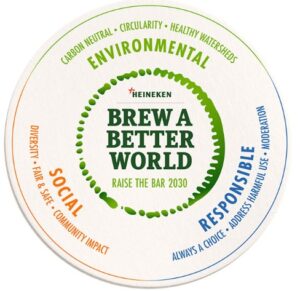
Corporate social responsibility is a growing concern among both employees and consumers. According to a study on corporate social responsibility (CSR) conducted in 2022, 67% of respondents expressed a preference for working for a socially responsible organization while a staggering 92% of consumers showcased a desire to purchase a product that supports a cause. This has put pressure on businesses around the globe to re-evaluate their current day-to-day operations, missions, and partnerships in favor of more socially responsible ones.
While many are still finding ways to implement these practices without affecting their productivity or profitability in an already arduous post-pandemic world, Heineken has excelled in this arena. We sat down with the President of the Americas of Heineken, Mr. Marc Busain, to share some expert tips on how businesses of all sizes can follow their lead and prioritize inclusivity, diversity, and sustainability within their company culture.
Table of Contents
1. View Language Barriers as Opportunities, Not Challenges
At ASTA-USA Translation Services, Inc., we are frequently called upon to translate mission-critical documents for organizations that are expanding to foreign markets or forging new business relationships. Many leaders view this as a challenge but overcoming language and cultural barriers is one of the most crucial aspects of corporate social responsibility.
Mr. Busain reports that he is Belgian and a native speaker of both French and Dutch. Despite this, his unique career path has led him and his family all over the world. Living abroad and conducting business in numerous countries—each with varying languages—might sound daunting to most, but for Marc Busain, language barriers are viewed as opportunities instead of challenges. Each new location, and each new language, inspires him to adapt and learn. After decades of travel and migrating from one country to another, Mr. Busain now speaks English, Spanish, and some German, in addition to his native French and Dutch languages.
Mr. Busain’s devotion to learning the language of the teams he was tasked with leading is the epitome of being an inclusive and culturally aware leader. While learning as many languages as Mr. Busain is a feat that most of us simply can’t match—small efforts do not go unnoticed. Learning a few basic phrases or translating business documents and newsletters, so that they are easily accessible and comprehended by all, goes a long way in building a more socially responsible business.
2. Don’t Reinvent the Wheel for the Sake of Corporate Social Responsibility
Heineken has an impressive presence in North and South America and serves consumers in more than 190 countries. The cultures and languages of these markets vary significantly, even within the Americas. Still, they always retain a focus on protecting the environment and their overall corporate social responsibility. While smaller organizations may not have the capital and resources to initiate a campaign as aggressive as Heineken’s “Brew a Better World”, Mr. Busain warns that it isn’t necessary to reinvent the wheel to make an impact. “There are good practices out there, and you can learn from them,” Busain notes.
Even with extensive capital and massive innovative teams at their disposal, Heineken still understands the importance of embracing the basics. Therefore, their campaign includes practices everyone can follow, such as sourcing more sustainable ingredients, reducing carbon emissions, and prioritizing recycling. In 2018, the brewing company reduced carbon emissions by 16% with around 65% percent of their ingredients being sourced sustainability. By 2030, they aspire to source 100% sustainable ingredients and achieve net zero emissions in production.
Small organizations can make small, tried, and true, changes over time to reduce their carbon footprint. While the changes may seem minor in the beginning, over time the myriad, and minutiae details add up to significant results. For instance, the average office in America uses 12.1 trillion sheets of paper annually and around 26% of all waste found in landfills is paper. A simple measure like implementing online billing for employees or sending email receipts instead of paper ones can majorly decrease paper waste in landfills and preserve hundreds of thousands of trees. The same goes for other aspects of corporate social responsibility, it isn’t always necessary to be innovative or cutting-edge: simply go with what works.
3. Learn, Adapt and Blend
As a specialized language services provider, ASTA-USA places inclusivity and diversity at the forefront of the company’s DNA. We lean on the expertise of native speakers across the globe who understand certain cultural nuances to ensure that the translations we provide resonate with the target audience. Heineken seamlessly adapts in this regard, whether it pertains to legal alcohol content levels, marketing materials, or consumer taste preferences but many small to midsize companies struggle with this aspect. While it is important to remain true to your company culture, brand, and overall vision, Mr. Busain stresses the importance of being able to learn, adapt and blend when entering new markets or incorporating more socially responsible business practices.
Learn
Don’t lean on guesswork when it comes to your plan for corporate social responsibility; perform thorough research regarding cultures, diversity, environmental practices, laws, or other notable concepts. The learning process can take several forms, whether tapping into community resources, speaking with employees directly, reading about diversity and cultures, or bringing in experts to educate the organization.
Adapt
Be as deliberate with your language and terminology in casual workplace gatherings as you would with your website or newsletters. For instance, choosing words like “partner” instead of “husband/wife” and using terminology like “sales team” in place of “salesmen” creates a more inclusive workplace culture. On an international level, identify commonly used languages and provide translated business documents or make other adaptations to showcase your organization’s commitment to inclusivity and diversity.
Blend
Adaptability for inclusivity is necessary, but Mr. Busain recommends remaining curious and asking questions throughout the learning and adapting phases. He advocates blending these changes into your organization’s existing company culture, instead of allowing them to override it.
By instituting these small changes and heeding the advice offered by an experienced leader in one of the most prominent organizations in the world, businesses of all sizes can be on the path to improved corporate social responsibility as they champion diversity, inclusion, and environmentally sustainable practices.

Get to Know Heineken’s Marc Busain
Marc Busain first joined Heineken in 1995 after a short stint in the painting industry. He first began with two trainee assignments in Burundi and France before being appointed as the Financial Controller in the Democratic Republic of Congo. Three years later, Busain was promoted to Finance Director until he relocated in 2000 to take the lead as the Finance Director of the Heineken Netherlands Supply Organization.
By 2006, Mr. Busain was named the Managing Director of the newly acquired Egypt division. For five years in Egypt, he watched the business transform into a large and successful operation that included everything from beer, CSD, wine, spirits, and a retail division before making his way to France and Mexico to act as Managing Director. In 2015, Busain was appointed the President of the Americas (North and South America) of Heineken and remains in this position where he makes crucial decisions pertaining to approximately 10.6B U.S. dollars of annual revenue and more than 35,000 employees each day.